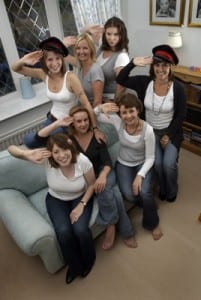The Modern Day WI
The Women’s Institute is an icon that speaks directly to the women of Britain. Holly Hardiman finds out about how new WI groups are doing things their way.
With roots reaching back to 1915, the WI has a long history embedded within the social heritage of the UK. It was initially founded to educate women across the nation about producing enough food for the community during the First World War. The modern WI is something of a mystery compared to such strong images of women on the ‘Home Front’.
But its association with jam and flower arranging is beginning to fade as groups all over the country are bringing the WI up to date, through new and exciting activities and an increase in younger members.
Anne Marcantonio, from Stratford-upon-Avon’s WI Lite, says that their group is one of the next generation of Women’s Institute groups to launch in the UK.
“We offer a really wide range of activities, meet monthly and have an interesting speaker, workshop or event designed to entertain our members. In recent months we’ve held a jewellery workshop, cocktail making workshop, a Christmas shopping evening in aid of a local Charity and heard tales from aWimbledon umpire.”
She believes that with these new activities and adaptations, the WI can remain relevant and important in today’s society.
“The WI provides opportunities to escape from day to day responsibilities, meet new people from different walks of life, try out new things and learn new skills, all within a supportive environment.”
Far from being all jam and Jerusalem, the modern version of the Women Institute has adapted with the times. Via Facebook and Twitter, they allow the world a glimpse at what really goes on at the WI. Kerry Edwards, president of City WI in Nottingham says:
“If people are interested and do some research into something, they’ll find out the truth – there’s a massive variety of types and ages of people who are involved in the WI, but most people don’t know that and so hold the stereotypical view.”
However, Anne says that even the traditional view of the WI is something to be proud of
“I don’t think the WI needed to shake of its old image, even if you accept the stereotypes, it was offering a great deal to many women.”
Kerry also explains that even though the members of her group are young, there’s still a passion for the skills taught by the WI generations ago.
“We’ve found that our members were really keen to learn how to knit. For a lot of younger people, learning to knit or bake is appealing… I think that’s because, although you can buy a scarf or a cake, nothing is ever better than homemade”, she says.
For Kerry, there’s a real feeling of belonging within the Women’s Institute, regardless of age or location. “The beauty of the WI is that every branch has its own personality… It’s really about building relationships with people you wouldn’t have become friends with any other way.”

